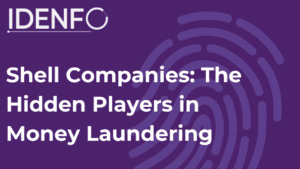In today's digital age, businesses are operating in a complex regulatory environment, where financial transactions occur frequently across borders. Compliance with Anti-Money Laundering (AML) regulations has become crucial for companies to prevent financial crimes such as money laundering and terrorist financing. In light of this, digital name screening has become an essential component of AML compliance, enabling companies to identify and manage high-risk entities and individuals. By reading this article, you'll learn how digital name screening helps businesses identify high-risk entities and individuals and take necessary actions to mitigate potential risks, ultimately protecting a business's operations and reputation.
What is name screening?
One of the critical components of AML compliance is name screening. Name screening is the process of checking customer names against various databases to identify high-risk individuals and entities. As discussed below, the screening process involves several steps, including customer screening, name matching, risk assessment, and risk management.
Customer screening
This first step in name screening involves collecting information such as the customer's name, address, date of birth, and identification number. This information is then used to conduct name screening to identify any potential risks associated with the customer.
Name matching
This next step involves comparing customer names against various databases, including watchlists, sanctions lists, and other databases, to identify any potential risks. Name matching is critical as it helps businesses identify individuals or entities that could pose a threat to their operations.
Risk assessment.
Once name matching is completed, the next step is risk assessment. Risk assessment involves analyzing the results of name matching and assigning a risk score to each customer. The risk score is based on several factors, including the customer's location, industry, transaction history, and other relevant information.
Risk Management
This final step in name screening involves taking necessary actions to mitigate potential risks identified during the name screening process. Risk management includes freezing accounts, blocking transactions, or reporting suspicious activities to regulatory authorities.
Importance of name screening
The importance of name screening in ensuring AML compliance cannot be overstated. Financial institutions that fail to comply with AML regulations risk severe penalties, including fines, reputational damage, and even loss of their license to operate. Name screening is an essential tool for mitigating these risks, and companies that implement robust name screening processes are better positioned to comply with AML regulations and protect their operations.
Challenges of traditional name screening
The traditional manual name screening process has its challenges. For example, manual name screening is often time-consuming and labor-intensive, leading to delays in customer onboarding and high costs. Additionally, manual name screening can produce a high number of false positives, which can be costly and time-consuming to resolve.
A digital solution
To address these challenges, many financial institutions are turning to technologically powered name screening solutions like Idenfo Direct. Idenfo Direct's advanced name screening solution uses technology and machine learning to improve accuracy and streamline the screening process. With Idenfo Direct, financial institutions can screen customer names against multiple databases simultaneously, significantly reducing the risk of false positives.
Moreover, Idenfo Direct's name screening solution is continually updated to reflect the latest sanctions lists and watchlists, ensuring that financial institutions stay up-to-date with the latest compliance regulations. With Idenfo Direct, financial institutions can implement robust compliance monitoring programs that help mitigate the risks of financial crime and ensure AML compliance.
In conclusion, name screening is a critical component of AML compliance that helps prevent financial crimes like money laundering and terrorist financing. By using name screening solutions like Idenfo Direct, companies can streamline the screening process, reduce false positives, and comply with AML regulations. Ultimately, effective name screening is essential for companies to comply with AML regulations, protect their operations, and maintain their reputation.









